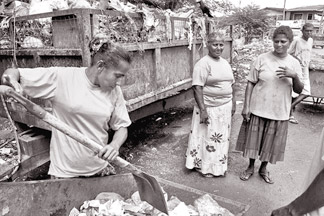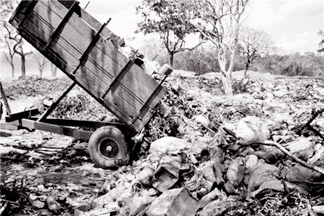|
A volume based user fee to be introduced for garbage
collection:
Move to check stench
By Ranil WIJAYAPALA
 |
| Filling the
hand carts |
 |
| A trailer
unloading garbage at a dump |
|

Priyantha Samarakkody
|
There may be several factors that may cause inconvenience to your
daily life and you may take relentless efforts to solve those problems
if you think they are your own problem affecting your life. On the
contrary, there are issues created by you to inconveniencing the entire
community and you think that it was not your responsibility to tackle
those problems.
The ever growing garbage at your home, working place or at the
business place is one such item that make the others inconvenient. Yet
you think that it is not your fault but a fault of the local authority
in charge of your area. That is the typical way the Sri Lankan used to
think about the garbage they produce and ultimately become a nuisance to
the society.
This is the way people used to think about the garbage, which has now
become a vital issue, especially for those living in thickly populated
cities.
They think that garbage is only a problem for them, only when the
garbage is there on your way side, in front of their residence or at a
place closer to their working place. But they are not aware that their
short-sighted thinking on the issue may create a huge problem to the
entire community and the environment they live.
Over the past few decades we have seen many attempts by Local
Government bodies to streamline the process of garbage collection
introducing various methods. Colour coded bins to put different types of
garbage, establishing recyclable waste collection centres at key places
in cities are some of the efforts they made to overcome this issue.
But sometimes we see these expensive bins are being used for other
purposes than the collection of garbage as those systems had seen a
natural death either due to lack of enthusiasm from the officials in
charge of these projects or due to lack of response from the public.
For the Western Province that is responsible for the generation of
over 60 percent of the municipal waste in the country, with more than
2,400 metric tonnes of solid municipal waste collected by the relevant
local authorities on a daily basis, this is not a problem they can avoid
any more. If the authorities keep mum on the issue the future generation
will have to see a huge issue before them if proper attitudes are
inculcate in the people to manage the problem they have created in the
environment without pointing the finger at anybody.
Waste Management Authority of the Western Provincial Council, an
institute established by the Western Provincial Council not so long ago
is now having as serious look at this garbage issue to start addressing
the issue even at a small level to expand it further to cover the entire
Western Provincial Council by 2016.
"This is yet another humanitarian operation we are going to launch,
but not to fight but to make the Western Province free of garbage",
Director, Waste Management Authority (WMA) of the Western Provincial
Council Priyantha Samarakkody said.
"Having introduced all the laws needed for streamlining the waste
management in the province, we could not implement those laws because of
the negative approach the people are having. So we have to launch this
program in the form of a humanitarian operation under the theme 'We Are
Here', Samarakkody added.
To tackle the garbage issue in the province the WMA along with the
Central Environment Authority launched Karadiyana dumping site and it
has now become the dumping site for the municipal waste from the
Dehiwala-Mount Lavinia and Moratuwa Municipal Councils, Kesbewa,
Boralesgamuwa and Maharagma Urban Councils.
Even after the implementation of the project people see that some
local authorities also used to dump garbage, whatever the lands they
come across in their local authority areas. "So it is important to
introduce new systems to make people and also the local authorities
responsible for the improper waste management habits", Samarakkody
added.
The 'Pivithuru Pura' (Clean Cities) program introduced by the WMA to
introduce seven steps in solid waste management from generation to final
dumping will be selected for the launching of the program to increase
the waste segregation at the source itself.
"We have identified 12 local authorities out of 20 where composting
projects are being implemented to expedite this program by introducing a
system of collecting only sorted garbage from the households and
business places", Samarakkody added.
Accordingly WMA has selected Horana Urban Council, Horana Pradeshiya
Saba, Kalutara Urban Council and Kalutara Pradeshiya Saba, Kaduwela
Municipal Council, Wattala Urban Council, Wattala Pradeshiya Saba,
Seethawakapura Urban Council, Attanagalla Pradeshiya Saba, Ja-Ela
Pradeshiya Saba, Negombo Municipal Council and Katana Pradeshiya Saba
for the implementation of the project.
"When we sort out the garbage we can find many ways to manage the
solid waste. The non degradable waste also can be made use for many
other things. When we take solid waste we can make use 30 percent of the
garbage for composting, bio-gas generation, and to have poultry food out
of food waste. Another 35 percent of garbage can be easily managed and
another 22 percent can be recycled. Only 19 per cent should be handed
over to the local authorities for proper management", he added.
"As people are not adhering to these systems many local authorities
have to make a lot of effort to manage the solid waste by way of
deploying manpower to segregate the garbage. Therefore, we should go for
a system to charge a fee from the people if they do not sort out the
garbage at their home itself. If they sort out the garbage they will
have to pay only for the 19 percent of the garbage and the balance 81
percent can be managed properly. We are expecting to implement this
project based on a Korean experience that had become successful", he
added.
Prof. Ahn Young Che, from the Korean International Cooperation
Agency, has advised the WMA to introduce the new mechanism to increase
the sorting out of garbage by introducing volume based fee for the
unsorted garbage from the households and the business places.
"We are educating the community, through various programs and
targeted groups and the Local Authority Members and the officials to
implement this program. First such workshop was held at the Sri Lanka
Foundation Institute to educate the Local Authority heads on the program
and discuss the issue further", Samarakkody added.
Through the implementation of this program the WMA is going to
introduce bins for the collection of recyclable and reusable waste, and
introducing bags for the collection of unsorted garbage.
"Once the system is introduced the Local Authorities will collect
only the garbage in the bags they have issued to the people. At the same
time the Local Authorities will also be made responsible to collect the
garbage from the households at a given time and impose fines on the
Local Authorities for not collecting the garbage", he added.
"The garbage bags can be issued to the public either by the Waste
Management Authority or by the relevant Local government body and the
cost of the bag, and the fee for the handling of the unsorted garbage
for the respective local authority will also be embedded in the prize of
the bag", he added.
According to Prof. Ahn Young from KOICA, the system introduced in
Korea helped them improve the waste management in Korea and people
welcome the program as it was very good solution for the garbage
problem.
"Through that program we could reduce the volume of garbage collected
in a drastic manner over the past two decades", he added.
"When implementing this volume based fee for the unsorted garbage
there may be tendency to put the garbage in various places. But the
availability of the Environmental Police and the Civil Defence
Committees at every village level, Sri Lanka can overcome all those
problems", Prof Ahn said.
"If you paying more for your garbage you must bear the responsibility
for that because you must adhere to sorting of garbage at its generation
itself and the sorted garbage will be handled free of charge by the
relevant local authorities", he added.
In the same manner authorities can also introduce user fee for waste
water, pollution charge for air or water pollution, and to impose taxes
if products are creating environmental pollution, he added. Deputy
Director of the WMA, Nalin Mannaperuma said the Western Provincial
Council has already taken steps to implement the program by amending
existing laws and creating new regulations.
"When we look at these laws we can take action against the mixing of
garbage, open dumping, open burning of waste and the dumping of garbage
in the places that can obstruct the community as they have been
identified as punishable offences. The spot fines have been changed from
Rs. 500 to Rs.5,000, the court fines from Rs.5,000 to Rs.50,000.
Therefore the required legal frame is already in force now", he added.
"At present source segregation is at lower than 20 percent and we
expect to increase that to 50 percent by 2016 through the implementation
of these programs.
The garbage that cannot be turned into a resource at the local
council level, the Western Province Waste Management Authority will
utilise for the final disposal with rest of the garbage to be turned in
to resources.
"These mega projects will be decided by the WMA in accordance with
the requirement of the area and the availability of lands in the area to
implement such projects. We have identified locations for the
implementation of the large-scale composting projects, bio gas projects
and sanitary landfills on the requirement basis", he added.
"To achieve these targets we have to start from somewhere and we need
the cooperation of the public for our endeavours to manage this problem
without creating a stink for the future", Mannaperuma added.
|


